Belarus election: Exiled leader calls weekend of 'peaceful rallies'
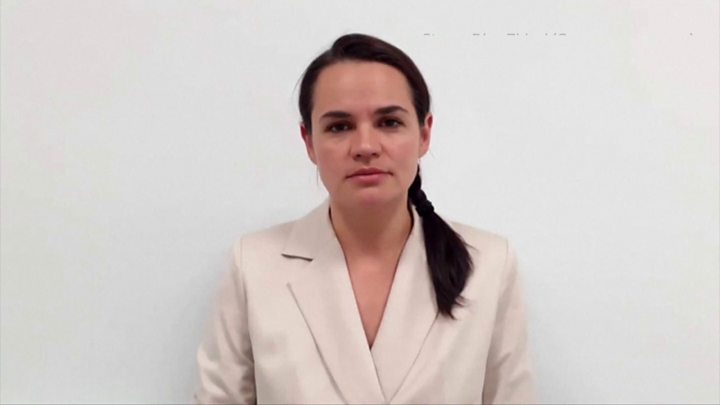
'Human life is the most precious thing': Svetlana Tikhanovskaya speaks out from exile
Belarus opposition leader Svetlana Tikhanovskaya has called for peaceful rallies across the country, after she was forced to leave for Lithuania in the wake of a disputed election.
"Don't stay on the sidelines," she said, proposing a broad council to work on the transfer of power.
Alexander Lukashenko has ruled Belarus since 1994 but Sunday's presidential vote was condemned by the EU and US.
Thousands of Belarusians have been protesting, urging Lukashenko to quit.
Some 6,700 people were arrested in the wake of the election, and many have spoken of torture at the hands of the security services.
As protests continued for a sixth day and walkouts from state factories grew, EU foreign ministers held an emergency video meeting and reportedly agreed to prepare new sanctions on Belarusian officials responsible for the crackdown.
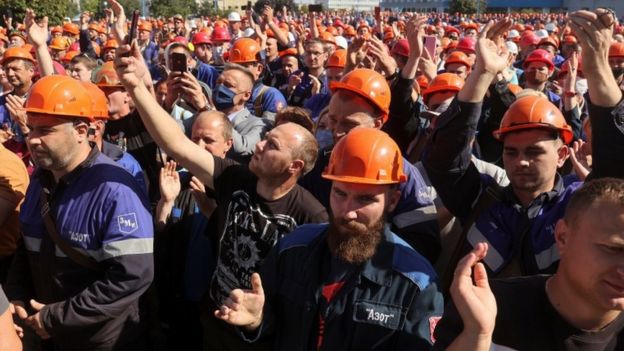
REUTERS
These workers at the Azot company in Grodno joined a protest on Friday
Accounts have emerged since authorities began releasing detainees, including from the notorious Okrestina detention centre in Minsk, and Amnesty International said detainees' stories suggested "widespread torture".
Ms Tikhanovskaya was held for seven hours herself on Monday night, when she went to register a complaint about the election, before she was forced into exile.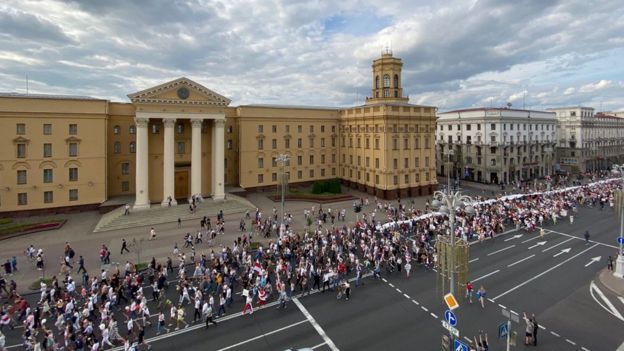
Accounts have emerged since authorities began releasing detainees, including from the notorious Okrestina detention centre in Minsk, and Amnesty International said detainees' stories suggested "widespread torture".
Ms Tikhanovskaya was held for seven hours herself on Monday night, when she went to register a complaint about the election, before she was forced into exile.

Protesters marched past the KGB security service building on Friday chanting "let them go"
Announcing final results, the Central Election Commission said Mr Lukashenko had won 80.1% of the vote and Ms Tikhanovskaya 10.12%, state media said. She insisted that where votes had been properly counted she had won support ranging from 60% to 70% and called on mayors to organise "peaceful mass gatherings" on Saturday and Sunday.

'I begged him to stop but he continued'
By Abdujalil Abdurasulov, BBC News, Minsk
Sergiy was detained on Monday. Riot police threw him into a police van and started torturing him.
They kept asking who the organiser was and each time when he said that there was no such a person, they electrocuted him with a stun gun. For every word he tried to say, they beat him with batons in response.
"The scariest part was that these people knew no limits," he said.
"You understand you're totally without any rights, that they could do anything they wanted. The pain was unbearable and I begged him to stop but he continued."
After hours of torture, Sergiy could barely breathe. Officers called an ambulance and sent him to hospital. Otherwise he might not have survived the notorious Okrestina detention centre.
Many have faced more vicious beatings and the mistreatment of detainees remaining in prisons continues. Volunteers outside the detention centre in Minsk on Friday asked us to be quiet and urged people not to clap and chant to support the detainees. They say that otherwise those who remain behind the prison walls will get beaten in revenge.
Prisoners continued to leave Okrestina on Friday, revealing their bruised and swollen bodies.
"They beat people ferociously, with impunity, and they arrest anyone. We were forced to stand in the yard all night. We could hear women being beaten. I don't understand such cruelty," one man said as he showed the BBC his bruising.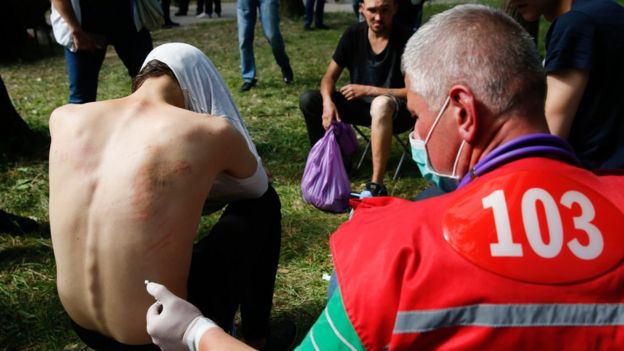
Announcing final results, the Central Election Commission said Mr Lukashenko had won 80.1% of the vote and Ms Tikhanovskaya 10.12%, state media said. She insisted that where votes had been properly counted she had won support ranging from 60% to 70% and called on mayors to organise "peaceful mass gatherings" on Saturday and Sunday.

'I begged him to stop but he continued'
By Abdujalil Abdurasulov, BBC News, Minsk
Sergiy was detained on Monday. Riot police threw him into a police van and started torturing him.
They kept asking who the organiser was and each time when he said that there was no such a person, they electrocuted him with a stun gun. For every word he tried to say, they beat him with batons in response.
"The scariest part was that these people knew no limits," he said.

"You understand you're totally without any rights, that they could do anything they wanted. The pain was unbearable and I begged him to stop but he continued."
After hours of torture, Sergiy could barely breathe. Officers called an ambulance and sent him to hospital. Otherwise he might not have survived the notorious Okrestina detention centre.
Many have faced more vicious beatings and the mistreatment of detainees remaining in prisons continues. Volunteers outside the detention centre in Minsk on Friday asked us to be quiet and urged people not to clap and chant to support the detainees. They say that otherwise those who remain behind the prison walls will get beaten in revenge.

Prisoners continued to leave Okrestina on Friday, revealing their bruised and swollen bodies.
"They beat people ferociously, with impunity, and they arrest anyone. We were forced to stand in the yard all night. We could hear women being beaten. I don't understand such cruelty," one man said as he showed the BBC his bruising.

EPA
Medics treated people as they left Okrestina detention centre on Friday
Belarus Interior Minister Yuri Karayev said he took responsibility for people being injured and wanted to apologise to people caught up in the violence.
Russian journalist Nikita Telizhenko wrote a harrowing account of his three days inside prison, detailing people lying on the floor of a detention centre, piled on top of each other, in a pool of blood and excrement. They were not allowed to use the toilet for hours on end or even change position
.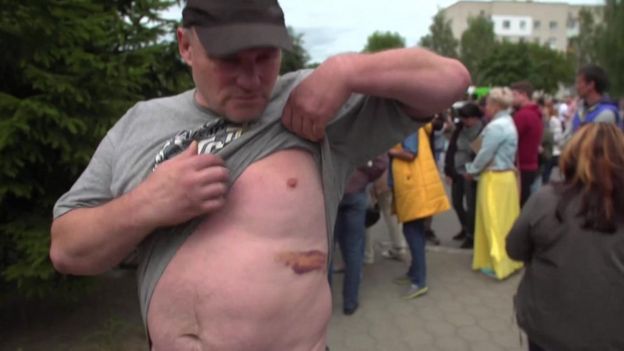
Belarus Interior Minister Yuri Karayev said he took responsibility for people being injured and wanted to apologise to people caught up in the violence.
Russian journalist Nikita Telizhenko wrote a harrowing account of his three days inside prison, detailing people lying on the floor of a detention centre, piled on top of each other, in a pool of blood and excrement. They were not allowed to use the toilet for hours on end or even change position
.

As detainees were allowed to leave the notorious Okrestina detention centre they revealed their wounds
What is opposition leader proposing?
Ms Tikhanovskaya, who arrived in Lithuania on Tuesday, said in her video message that Belarus authorities should stop violence and "engage in dialogue" and her supporters should sign an online petition calling for a vote recount.
In a separate message she praised Belarusians for showing "we are a majority and this country belongs to us, to the nation rather than one man".
She then called for:
a co-ordinating council made up of "civil society activists, respected Belarusians and professionals" to secure a transfer of power
involvement from personnel from industrial companies, trade unions and other civil society organisations the international community and European states would help organise dialogue with Belarus authorities
authorities should free all detainees, remove riot police and troops from the streets and prosecute those who ordered violence.
Ms Tikhanovskaya, 37, only entered the presidential race after her husband was arrested and blocked from registering for the vote. Her statements on Friday were a far cry from her last message on Tuesday, when she said she had left Belarus for the sake of her children and spoke of herself as "a weak woman".

What is happening on the ground?
Belarusians returned to the streets of several cities on Friday. In the western city of Grodno, workers massed outside a management office, demanding fresh elections, and car workers gathered in big numbers at the Maz plant in Minsk. Walkouts were also reported at a number of other factories.
Several strikes have been reported at state-owned factories. Hundreds of employees were seen walking out at truck-maker Belaz in Zhodino to the north-east of the capital.
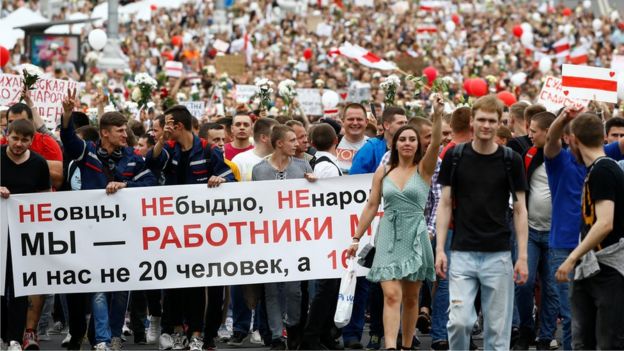
REUTERS
Protesters including tractor workers carried a banner ridiculing the president, who had dismissed protesters as sheep
Mr Lukashenko, who has previously dismissed protesters as sheep condemned "attempts to inflame workers" and spoke of walkouts involving 20 people.
Tractor workers taking part in a big march in Minsk on Friday carried a banner reading: "We're not sheep, we're not a herd, we're not little people... there are not 20 of us but 16,000."
EU foreign ministers agreed on Friday to draw up a list of people to be targeted with sanctions. The bloc, which has condemned Sunday's vote as "neither free nor fair" has imposed sanctions before but eased the measures four years ago when President Lukashenko released other detainees.
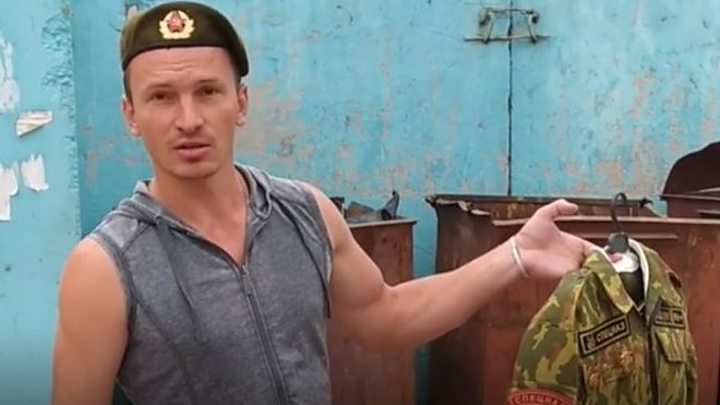
An ex-elite soldier in Belarus bins his uniform in protest
Czech Prime Minister Andrej Babis said sanctions should be imposed "until free and transparent elections are held in Belarus with the participation of international observers". Poland has promised to loosen visa restrictions on its neighbour to help support civil society.
Ahead of the emergency EU meeting, Belarus Foreign Minister Vladimir Makei said his country was ready for "constructive and objective" talks with other countries.
Mr Lukashenko, who has previously dismissed protesters as sheep condemned "attempts to inflame workers" and spoke of walkouts involving 20 people.
Tractor workers taking part in a big march in Minsk on Friday carried a banner reading: "We're not sheep, we're not a herd, we're not little people... there are not 20 of us but 16,000."
EU foreign ministers agreed on Friday to draw up a list of people to be targeted with sanctions. The bloc, which has condemned Sunday's vote as "neither free nor fair" has imposed sanctions before but eased the measures four years ago when President Lukashenko released other detainees.

An ex-elite soldier in Belarus bins his uniform in protest
Czech Prime Minister Andrej Babis said sanctions should be imposed "until free and transparent elections are held in Belarus with the participation of international observers". Poland has promised to loosen visa restrictions on its neighbour to help support civil society.
Ahead of the emergency EU meeting, Belarus Foreign Minister Vladimir Makei said his country was ready for "constructive and objective" talks with other countries.
Belarus election: Women form 'solidarity chains' to condemn crackdown
13 August 2020
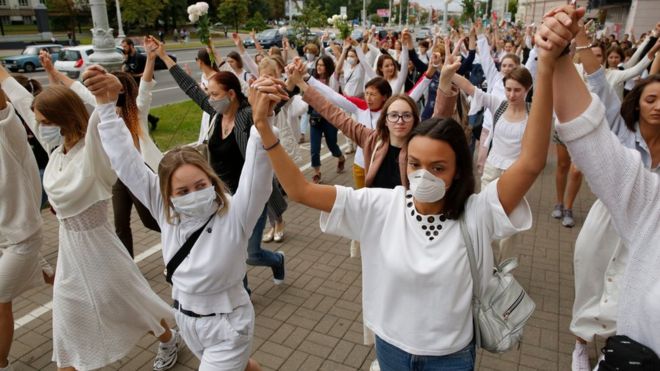
EPA
Many women have been wearing white as they protest against the disputed election result and police violence
Women have formed human chains in Belarus to condemn a crackdown on protests as demonstrations over the disputed election entered a fifth day.
Many dressed in white and carried flowers as they called for an end to police brutality.
Unrest erupted after long-time leader Alexander Lukashenko was declared winner in a vote condemned by the EU and US as neither free nor fair.
Thousands of people have been arrested and at least two have died.
In the latest official figures, the interior ministry said police had detained 700 people during protests on Wednesday, bringing the total number to 6,700.
Some detainees were released on Thursday. Tearful relatives gathered outside a jail north of the capital Minsk, hoping to be reunited with their loved ones or for information on their whereabouts.
Several strikes have been reported at state-owned factories, where workers object to the violent treatment of protesters. Hundreds of employees were seen walking out at truck-maker Belaz, in Zhodino to the north-east of the capital.
Skip Twitter post by @abdujalil
The workers at the factory that makes famous trucks Belaz are going on strike against the violence that authorities are using to disperse the crowds. The protest movement is taking a new shape in #Belarus pic.twitter.com/ZNe8XvqG47— Abdujalil A (@abdujalil) August 13, 2020
Report
End of Twitter post by @abdujalil

Women in their thousands formed "solidarity chains" in Minsk and other cities as protests went into a fifth day. Participants told reporters they wanted a peaceful resolution, as they called for all detained protesters to be freed.
During the afternoon, women marched in big numbers down the main thoroughfare in Minsk, Independence Avenue, accompanied by a chorus of hooting cars.
Skip Twitter post by @oivshina
Проспект Независимости прямо сейчас. Это видео Би-би-си прислал житель Минска. pic.twitter.com/NpbhB4kddu— Ольга Ившина (@oivshina) August 13, 2020
Report
End of Twitter post by @oivshina

Video footage shared on social media showed opposition figure Maria Kolesnikova joining the female protesters in Minsk, holding a bunch of flowers.
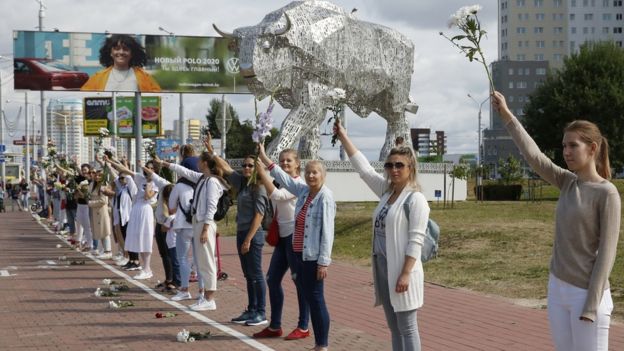
EPA
She was one of three women who pooled their resources to spearhead the opposition. The other two have left the country.
Veronika Tsepkalo fled Belarus on the day of the vote while the main opposition candidate in the election, Svetlana Tikhanovskaya, was briefly detained on Monday before being forced to leave for Lithuania.
Ms Tikhanovskaya, 37, released a video saying she made the "very difficult decision" to leave because of her children.
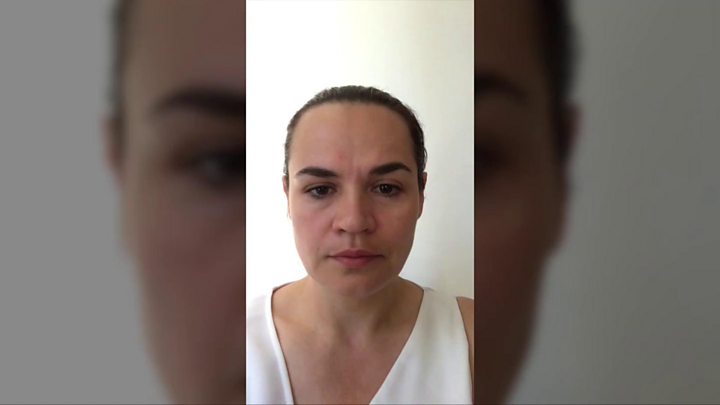
Svetlana Tikhanovskaya: "Not one life is worth what is happening now"
The opposition candidate was a stay-at-home mother until she entered the race after her husband was arrested and blocked from registering for the vote.
She became Mr Lukashenko's toughest opposition challenge in years, leading large rallies in the lead up to the vote.
But Mr Lukashenko dismissed her bid, saying a woman could not lead Belarus.
"Our constitution is not for women," he said earlier this year. "Our society has not matured enough to vote for a woman. This is because by constitution the president handles a lot of power."
Ms Tikhanovskaya, 37, released a video saying she made the "very difficult decision" to leave because of her children.

Svetlana Tikhanovskaya: "Not one life is worth what is happening now"
The opposition candidate was a stay-at-home mother until she entered the race after her husband was arrested and blocked from registering for the vote.
She became Mr Lukashenko's toughest opposition challenge in years, leading large rallies in the lead up to the vote.
But Mr Lukashenko dismissed her bid, saying a woman could not lead Belarus.
"Our constitution is not for women," he said earlier this year. "Our society has not matured enough to vote for a woman. This is because by constitution the president handles a lot of power."
Challenger fled Belarus 'for sake of her children'
Nobel literature laureate Svetlana Alexievich accused the authorities of declaring war on their own people and urged Mr Lukashenko to stand down.
Aged 65, he has ruled the former Soviet country since 1994 and has described opposition supporters as "sheep" controlled from abroad.
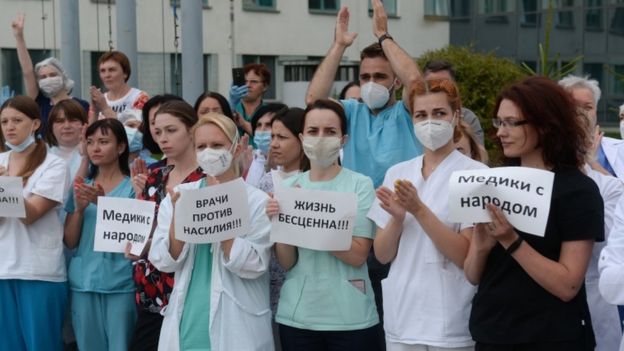
EPA
These medics held up notices saying "doctors against violence" and "medics with the people"
As protests continued on Thursday, some workers organised strikes and walkouts in Minsk, Grodno in the west and Zhodino.
Medics walked out of hospitals for a second day to join the demonstrations and performers from the Belarusian State Philharmonic held up a message saying "Philharmonia prays for the people".
As protests continued on Thursday, some workers organised strikes and walkouts in Minsk, Grodno in the west and Zhodino.
Medics walked out of hospitals for a second day to join the demonstrations and performers from the Belarusian State Philharmonic held up a message saying "Philharmonia prays for the people".
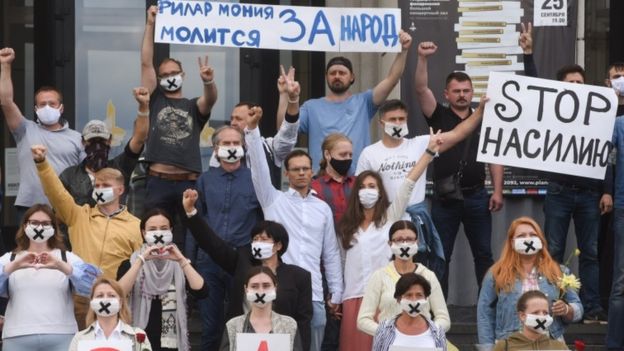
EPA
Some of the performers covered their mouths with crosses to say their voices had been stolen
Russian internet giant Yandex said armed individuals had entered two of its offices in Minsk and barred employees inside from leaving. They left some hours later.
 Shock at police brutality as testimonies mount
Shock at police brutality as testimonies mount
By Olga Ivshina, BBC Russian
The body of evidence of police brutality, both in the streets and inside remand prisons, is mounting. Detainees include not only opposition activists, but also many journalists and accidental passers-by.
One of the released journalists, Nikita Telizhenko of the Russian Znak.com news website, published a harrowing account of three days inside prison. Now back in Russia, he describes people lying on the floor of a detention centre, piled on top of each other, in a pool of blood and excrement. Not allowed to use the toilet for hours on end or even change position.
He says he saw seriously injured people, with broken limbs and severe bruising, not only left without medical help, but kicked and beaten by the guards more.
Telizhenko's testimony is confirmed by countless posts on social media - photos, videos, stories. I spoke to an American woman who was visiting her Belarusian boyfriend in Minsk - he got detained for no apparent reason. Not only had he not been protesting, but he was asleep in bed when the police came to his flat, kicked down the door and took him away.
What else has been happening?
Election officials said Mr Lukashenko won 80% of the vote on Sunday, but protests erupted amid widespread allegations of vote rigging.
Hundreds of people have been injured in a police crackdown on protests, some seriously. A BBC crew was attacked by police on Tuesday evening.
Officials have confirmed the deaths of two people.
One demonstrator died during a protest in the capital Minsk on Monday. The Belarusian interior ministry alleged an explosive device had gone off in his hand.
Ambassadors from European countries laid flowers on Thursday where he died, a day before EU foreign ministers were due to consider imposing sanctions on Belarus.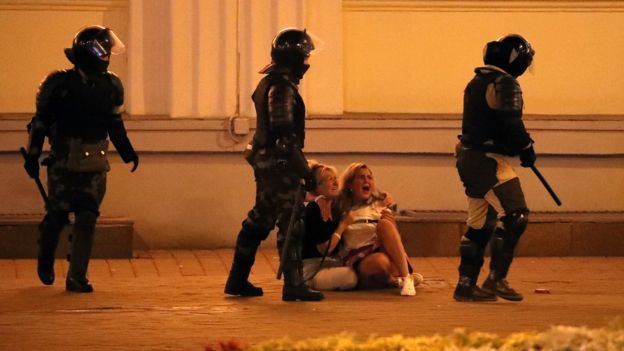
Russian internet giant Yandex said armed individuals had entered two of its offices in Minsk and barred employees inside from leaving. They left some hours later.
 Shock at police brutality as testimonies mount
Shock at police brutality as testimonies mountBy Olga Ivshina, BBC Russian
The body of evidence of police brutality, both in the streets and inside remand prisons, is mounting. Detainees include not only opposition activists, but also many journalists and accidental passers-by.
One of the released journalists, Nikita Telizhenko of the Russian Znak.com news website, published a harrowing account of three days inside prison. Now back in Russia, he describes people lying on the floor of a detention centre, piled on top of each other, in a pool of blood and excrement. Not allowed to use the toilet for hours on end or even change position.
He says he saw seriously injured people, with broken limbs and severe bruising, not only left without medical help, but kicked and beaten by the guards more.
Telizhenko's testimony is confirmed by countless posts on social media - photos, videos, stories. I spoke to an American woman who was visiting her Belarusian boyfriend in Minsk - he got detained for no apparent reason. Not only had he not been protesting, but he was asleep in bed when the police came to his flat, kicked down the door and took him away.

What else has been happening?
Election officials said Mr Lukashenko won 80% of the vote on Sunday, but protests erupted amid widespread allegations of vote rigging.
Hundreds of people have been injured in a police crackdown on protests, some seriously. A BBC crew was attacked by police on Tuesday evening.
Officials have confirmed the deaths of two people.
One demonstrator died during a protest in the capital Minsk on Monday. The Belarusian interior ministry alleged an explosive device had gone off in his hand.
Ambassadors from European countries laid flowers on Thursday where he died, a day before EU foreign ministers were due to consider imposing sanctions on Belarus.

EPA
A 25-year-old man also died in the south-eastern city of Gomel.
His mother told Radio Free Europe that her son had not taken part in any protests and was arrested as he was going to see his girlfriend. She said he had heart problems and was kept for hours in a police van.
People have been shouting the words "get out" from their balconies, the same slogan used by protesters on the ground. Police responded by firing rubber bullets.
The United Nations has condemned the use of violence by authorities.
Video footage shared on social media has shown ex-special forces officers throwing their uniforms into bins in disgust at the actions of their former colleagues.
"I was proud of the unit I served [in]. Now I am ashamed. Shame on everyone who follows such orders," one former officer said.
A 25-year-old man also died in the south-eastern city of Gomel.
His mother told Radio Free Europe that her son had not taken part in any protests and was arrested as he was going to see his girlfriend. She said he had heart problems and was kept for hours in a police van.
People have been shouting the words "get out" from their balconies, the same slogan used by protesters on the ground. Police responded by firing rubber bullets.
The United Nations has condemned the use of violence by authorities.
Video footage shared on social media has shown ex-special forces officers throwing their uniforms into bins in disgust at the actions of their former colleagues.
"I was proud of the unit I served [in]. Now I am ashamed. Shame on everyone who follows such orders," one former officer said.
Belarus elections: Shocked by violence, people lose their fear
By Tatsiana Melnichuk
BBC News Russian, Minsk
13 August 2020
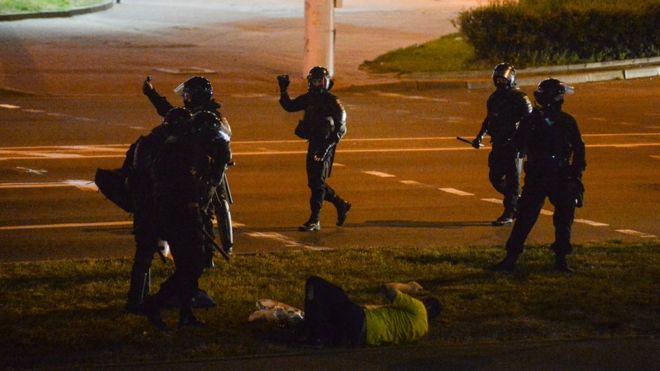
13 August 2020

EPA
Authorities insist their response to the protests has been "adequate" but Belarusians are appalled
Seeing police brutality up close has shocked Belarusians, first during the street clashes with protesters and then as accounts spread of cruelty towards those taken to detention centres.
A 25-year-old man died in custody after he was detained on Sunday. His mother said he had been held in a police van for hours.
A street very close to my home in Minsk was at the heart of one of the confrontations between police and protesters this week.
Stun grenades went off and people screamed as riot police struck them with batons. The screams were so loud that they drowned out the sound of the grenades.
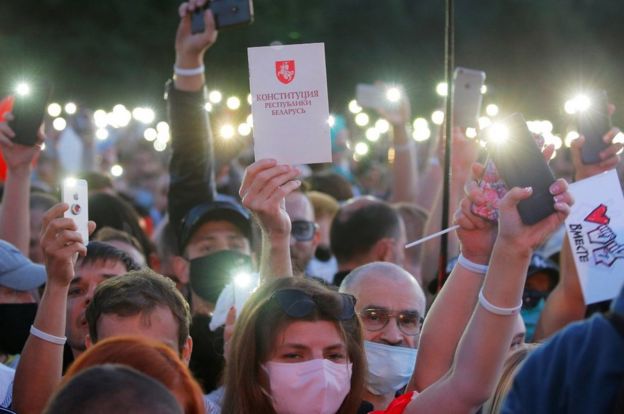
Defiance and anger
The protests are unprecedented in their scale as people in dozens of cities, towns and even villages rise up and call for the main opposition figure, Svetlana Tikhanovskaya, to be recognised as the winner of Sunday's presidential election.
I watched as young men and women ran for safety past my windows, taking a break from the clashes before returning to face the police.
Skip Twitter post by @franakviacorka
I was thinking that the protest will decrease today. But no! After being shot and beaten last night, even more, people are showing up. The spontaneous rallies were taking place around Belarus, women initiated marches. Protest is fully decentralized, Hong Kong style pic.twitter.com/UqPcGo8mf8— Franak Viačorka (@franakviacorka) August 12, 2020
Report
End of Twitter post by @franakviacorka
My female neighbours are trying to stop their sons and husbands from joining the nightly protests, worried for their safety.
Some 7,000 people have been detained and you don't have to be protesting to be arrested. My friend's son, a university lecturer, was detained randomly before the elections and spent three days in a cell. The detainee who died in Gomel in southern Belarus, Alexander Vikhor, had been on his way to see his girlfriend, according to his mother.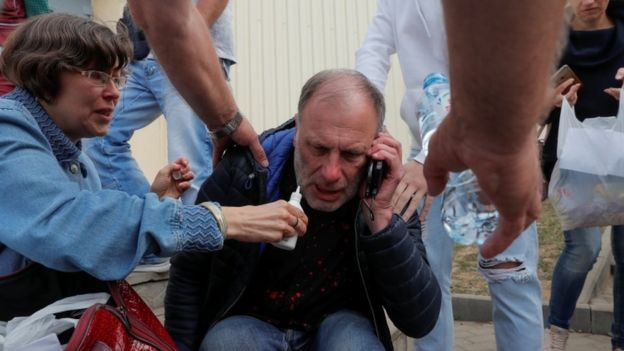
Seeing police brutality up close has shocked Belarusians, first during the street clashes with protesters and then as accounts spread of cruelty towards those taken to detention centres.
A 25-year-old man died in custody after he was detained on Sunday. His mother said he had been held in a police van for hours.
A street very close to my home in Minsk was at the heart of one of the confrontations between police and protesters this week.
Stun grenades went off and people screamed as riot police struck them with batons. The screams were so loud that they drowned out the sound of the grenades.

Defiance and anger
The protests are unprecedented in their scale as people in dozens of cities, towns and even villages rise up and call for the main opposition figure, Svetlana Tikhanovskaya, to be recognised as the winner of Sunday's presidential election.
I watched as young men and women ran for safety past my windows, taking a break from the clashes before returning to face the police.
Skip Twitter post by @franakviacorka
I was thinking that the protest will decrease today. But no! After being shot and beaten last night, even more, people are showing up. The spontaneous rallies were taking place around Belarus, women initiated marches. Protest is fully decentralized, Hong Kong style pic.twitter.com/UqPcGo8mf8— Franak Viačorka (@franakviacorka) August 12, 2020
Report
End of Twitter post by @franakviacorka

My female neighbours are trying to stop their sons and husbands from joining the nightly protests, worried for their safety.
Some 7,000 people have been detained and you don't have to be protesting to be arrested. My friend's son, a university lecturer, was detained randomly before the elections and spent three days in a cell. The detainee who died in Gomel in southern Belarus, Alexander Vikhor, had been on his way to see his girlfriend, according to his mother.

REUTERS
Anxious parents wait outside a detention centre in Minsk
The interior ministry insists its measures are "adequate" and points out that more than 100 police have been injured and 28 treated in hospital. There have been deliberate attempts by drivers to run over traffic police and "law enforcers have used weapons" to stop them, it says.
People here are angry: with police, authorities and above all President Alexander Lukashenko. No-one I have spoken to has any support for what police are doing.
The interior ministry insists its measures are "adequate" and points out that more than 100 police have been injured and 28 treated in hospital. There have been deliberate attempts by drivers to run over traffic police and "law enforcers have used weapons" to stop them, it says.
People here are angry: with police, authorities and above all President Alexander Lukashenko. No-one I have spoken to has any support for what police are doing.
They watch the Belarusian leader speaking on TV and laugh at him. They wonder what he thinks will happen next and how he will live with himself.
Shouting from balconies
A friend tried to travel across Minsk, which is difficult now as several metro stations in the centre are closed. When she complained to metro staff on the platform, they apologised and blamed the situation on Mr Lukashenko.
He has dismissed the majority of protesters as being jobless or having a criminal past and has instructed the government to find jobs for them.
Police have started going around the courtyards outside blocks of flats, grabbing anyone they can lay their hands on, including teenagers who were not even protesting. And this has angered people further.
Skip Twitter post by @geopconsulting
Understanding leaving their home would be followed by detentions, Belarusians shout from their balconies. They ask Lukashenko to leave the power #Minsk #Belarus #belaruselections #Беларусь pic.twitter.com/KnaFs85d0J— Geopolitika Consulting (@geopconsulting) August 12, 2020
Report
End of Twitter post by @geopconsulting

Belarusians have shouted from their balconies, swearing and screaming at police to go away. Police have responded by firing rubber bullets at the balconies.
Women have been running up to riot police, imploring them to be civil, begging them to stop their attacks.
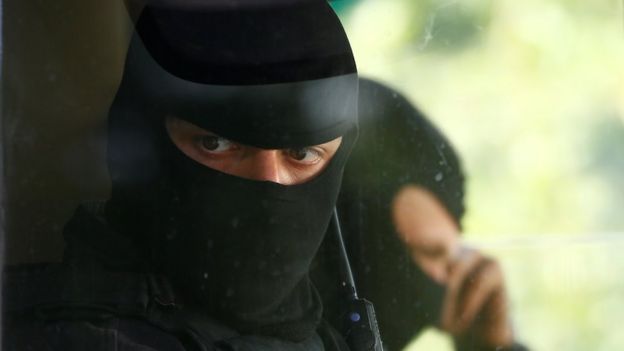
REUTERS
A Belarusian law enforcement officer waits in an armoured vehicle in Minsk
There have been crackdowns before - in 2006 and 2010, although the protests were smaller in scale.
But the level of brutality is shocking and new. Protesters and often passers-by have been targeted by people clad in black, wearing balaclavas and with no insignia or uniform. This happened to a BBC team too.
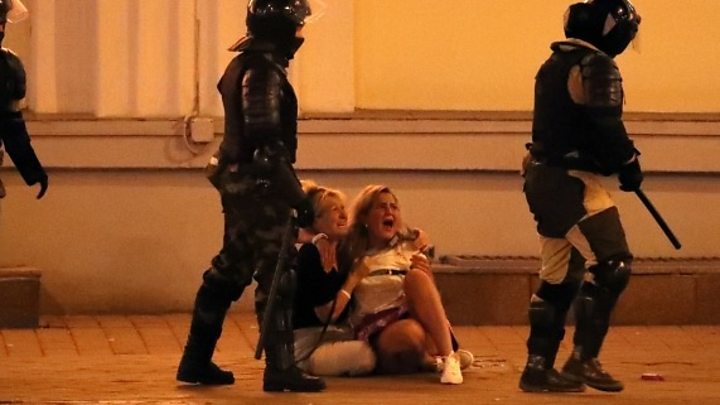
A BBC team in Minsk encountered violent scenes on Monday night
VIDEO BELOW
Although people here are defiant, they are also worried for the future.
Further sanctions on Belarus would push up prices in a country where salaries are already low. There is also the fear of losing your job if you are identified as backing the protests.
No leadership for exiled opposition
But there is a fearlessness too among the largely young protesters. These are mainly ordinary Belarusians, not the hardened opposition supporters we have seen in previous protests, and they have no clear leader.
The old opposition has gone. Some who stood against the president or campaigned for democracy are behind bars, others have fled into exile.
So far the new generation of protesters have no clear demands or political programme, only slogans: "Go away! Long live Belarus! Release the prisoners!"
Skip Twitter post by @BBCWillVernon
Some people detained during protests in Belarus are being released from a jail north of Minsk. Tearful relatives wait for their loved ones - many do not know where they are being held and are simply hoping they will emerge. People clap when people are released. pic.twitter.com/SXn5SpOR0b— Will Vernon (@BBCWillVernon) August 13, 2020
Report
End of Twitter post by @BBCWillVernon
Svetlana Tikhanovskaya herself was not an opposition leader but a stay-at-home mother whose straightforward approach symbolised people's desire for change. But she too has gone.
There is still leadership and community here, however. A crowdfunding initiative has collected over $1m (£765,000) for the wounded and for detainees: for food, lawyers' fees and fines.
The protests were quieter on Wednesday night and Belarusians are now looking to stage walkouts in their workplaces.
Some staff in factories and academic institutes have gone on strike, demanding an end to the violence and calling for Ms Tikhanovskaya to be recognised as the election winner.
There have been crackdowns before - in 2006 and 2010, although the protests were smaller in scale.
But the level of brutality is shocking and new. Protesters and often passers-by have been targeted by people clad in black, wearing balaclavas and with no insignia or uniform. This happened to a BBC team too.

A BBC team in Minsk encountered violent scenes on Monday night
VIDEO BELOW
Although people here are defiant, they are also worried for the future.
Further sanctions on Belarus would push up prices in a country where salaries are already low. There is also the fear of losing your job if you are identified as backing the protests.
No leadership for exiled opposition
But there is a fearlessness too among the largely young protesters. These are mainly ordinary Belarusians, not the hardened opposition supporters we have seen in previous protests, and they have no clear leader.
The old opposition has gone. Some who stood against the president or campaigned for democracy are behind bars, others have fled into exile.
So far the new generation of protesters have no clear demands or political programme, only slogans: "Go away! Long live Belarus! Release the prisoners!"
Skip Twitter post by @BBCWillVernon
Some people detained during protests in Belarus are being released from a jail north of Minsk. Tearful relatives wait for their loved ones - many do not know where they are being held and are simply hoping they will emerge. People clap when people are released. pic.twitter.com/SXn5SpOR0b— Will Vernon (@BBCWillVernon) August 13, 2020
Report
End of Twitter post by @BBCWillVernon

Svetlana Tikhanovskaya herself was not an opposition leader but a stay-at-home mother whose straightforward approach symbolised people's desire for change. But she too has gone.
There is still leadership and community here, however. A crowdfunding initiative has collected over $1m (£765,000) for the wounded and for detainees: for food, lawyers' fees and fines.
The protests were quieter on Wednesday night and Belarusians are now looking to stage walkouts in their workplaces.
Some staff in factories and academic institutes have gone on strike, demanding an end to the violence and calling for Ms Tikhanovskaya to be recognised as the election winner.
Belarus election: Second protester dies as UN sounds alarm
13 August 2020
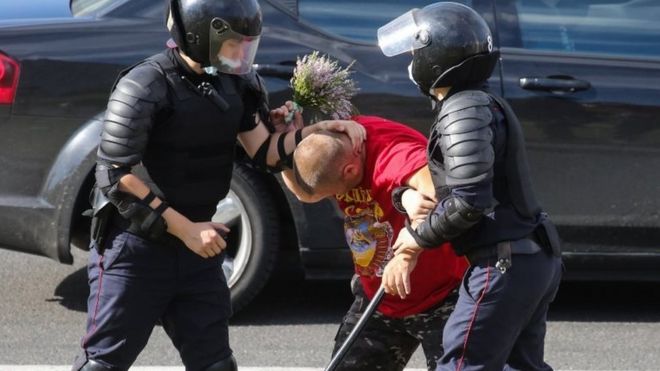
EPA
Belarusian police have been accused of using violence against protesters
A protester has died in Belarus in police custody, the second death since clashes with police erupted on Sunday over a disputed presidential election.
Officials say the cause of death of the 25-year-old man in Gomel is unclear. His mother says he had heart problems and was kept for hours in a police van.
In Brest, police said they used live bullets when they came under attack.
The UN has condemned the use of violence by authorities, as protests continued for a fourth night.
The UN High Commissioner for Human Rights, Michelle Bachelet, said police officers were reported to have used excessive force, firing rubber bullets and water cannons, and also throwing stun grenades.
"Reports suggest that more [than] approximately 6,000 people have been detained in the last three days, including bystanders, as well as minors, suggesting a trend of massive arrests in clear violation of international human rights standards," Ms Bachelet said in a statement.
"Even more disturbing are the reports of ill-treatment during and after detention", she added, calling for the release of all those unlawfully detained. State TV has shown some bruised detainees lined up and being asked if they intend to continue "making revolution".
At least 200 protesters have been wounded, some seriously. A BBC crew was also attacked by police on Tuesday evening.
A demonstrator died during a protest in the capital Minsk on Monday. The Belarusian interior ministry alleged an explosive device had gone off in his hand.
On Wednesday evening, more clashes were reported as protesters rallied again in Minsk and other Belarusian cities. The numbers on the streets appeared to be smaller that during previous nights.
The protests erupted hours after Belarusian leader Alexander Lukashenko, in power since 1994, was declared the winner of Sunday's vote, which has been condemned by the EU as "neither free nor fair".
The main opposition contender, Svetlana Tikhanovskaya, was then briefly held before being forced to leave for neighbouring Lithuania.
What is known about the protester's death in Gomel?
The 25-year-old man died on Wednesday in the south-eastern city, the Belarusian Investigative Committee was quoted as saying by Belta news agency.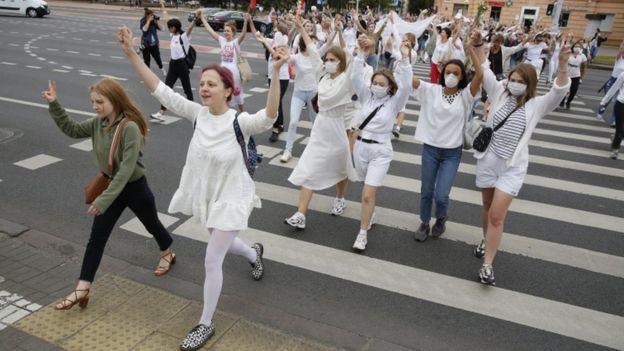
A protester has died in Belarus in police custody, the second death since clashes with police erupted on Sunday over a disputed presidential election.
Officials say the cause of death of the 25-year-old man in Gomel is unclear. His mother says he had heart problems and was kept for hours in a police van.
In Brest, police said they used live bullets when they came under attack.
The UN has condemned the use of violence by authorities, as protests continued for a fourth night.
The UN High Commissioner for Human Rights, Michelle Bachelet, said police officers were reported to have used excessive force, firing rubber bullets and water cannons, and also throwing stun grenades.
"Reports suggest that more [than] approximately 6,000 people have been detained in the last three days, including bystanders, as well as minors, suggesting a trend of massive arrests in clear violation of international human rights standards," Ms Bachelet said in a statement.
"Even more disturbing are the reports of ill-treatment during and after detention", she added, calling for the release of all those unlawfully detained. State TV has shown some bruised detainees lined up and being asked if they intend to continue "making revolution".
At least 200 protesters have been wounded, some seriously. A BBC crew was also attacked by police on Tuesday evening.
A demonstrator died during a protest in the capital Minsk on Monday. The Belarusian interior ministry alleged an explosive device had gone off in his hand.
On Wednesday evening, more clashes were reported as protesters rallied again in Minsk and other Belarusian cities. The numbers on the streets appeared to be smaller that during previous nights.
The protests erupted hours after Belarusian leader Alexander Lukashenko, in power since 1994, was declared the winner of Sunday's vote, which has been condemned by the EU as "neither free nor fair".
The main opposition contender, Svetlana Tikhanovskaya, was then briefly held before being forced to leave for neighbouring Lithuania.
What is known about the protester's death in Gomel?
The 25-year-old man died on Wednesday in the south-eastern city, the Belarusian Investigative Committee was quoted as saying by Belta news agency.

EPA Women in Minsk rallied on Wednesday in support of detained protesters
The committee said the man had been arrested on Sunday and later sentenced to 10 days in prison for taking part in an illegal protest.
He was taken to hospital when he started feeling unwell - but later died, the committee said. The incident is being investigated.
The protester's mother told Radio Free Europe that her son had not taken part in any protests and was arrested as he was going to see his girlfriend.
How has the world reacted?
Mr Lukashenko won 80% of Sunday's vote, according to election officials, but there were widespread allegations of vote rigging.
EU foreign policy chief Josep Borrell said Belarusians had shown "the desire for democratic change" in the election campaign.
The committee said the man had been arrested on Sunday and later sentenced to 10 days in prison for taking part in an illegal protest.
He was taken to hospital when he started feeling unwell - but later died, the committee said. The incident is being investigated.
The protester's mother told Radio Free Europe that her son had not taken part in any protests and was arrested as he was going to see his girlfriend.
How has the world reacted?
Mr Lukashenko won 80% of Sunday's vote, according to election officials, but there were widespread allegations of vote rigging.
EU foreign policy chief Josep Borrell said Belarusians had shown "the desire for democratic change" in the election campaign.
How protests shook up the election
Sweden's foreign minister said EU foreign ministers would meet on Friday to discuss imposing sanctions on Belarus.
Lithuania, Poland and Latvia said they were prepared to mediate, provided Belarusian authorities stopped violence against protesters, release detained demonstrators and form a national council with members of civil society. They warned that the alternative was sanctions.

EPA Alexander Lukashenko has been in power since 1994
US Secretary of State Mike Pompeo agreed the vote "was not free and fair", adding that the people "should be given the freedoms that they are demanding".
Meanwhile, Russian President Vladimir Putin earlier congratulated Mr Lukashenko on his victory, despite friction over accusations of a Russian plot which Mr Lukashenko has tried to link to the opposition.
The leaders of China, Kazakhstan, Uzbekistan, Moldova and Azerbaijan have sent messages of support.
What has happened to the opposition?
When Ms Tikhanovskaya, 37, went to the electoral committee on Monday evening to complain about the results that gave her just 10% of the vote, she was detained for seven hours. By Tuesday morning she had arrived in Lithuania.
She was a stay-at-home mother until she entered the race after her husband was arrested and blocked from registering for the vote.
She was one of three women who pooled their resources to spearhead the opposition. Veronika Tsepkalo fled Belarus on the day of the vote and Maria Kolesnikova remains in Belarus.
According to an associate, Ms Tikhanovskaya had been escorted from the country by the authorities as part of a deal to allow the release of her campaign manager.
A second video later emerged that appeared to have been made during her detention. The images show her, head lowered, reading nervously from a script as she urges her supporters to "obey the law" and stay away from street protests.
Ahead of Sunday's election, crowds flocked to opposition rallies, with Belarusians angered in part by the Lukashenko government's response to coronavirus.
The president has downplayed the outbreak, advising citizens to drink vodka and use saunas to fight the disease.
US Secretary of State Mike Pompeo agreed the vote "was not free and fair", adding that the people "should be given the freedoms that they are demanding".
Meanwhile, Russian President Vladimir Putin earlier congratulated Mr Lukashenko on his victory, despite friction over accusations of a Russian plot which Mr Lukashenko has tried to link to the opposition.
The leaders of China, Kazakhstan, Uzbekistan, Moldova and Azerbaijan have sent messages of support.
What has happened to the opposition?
When Ms Tikhanovskaya, 37, went to the electoral committee on Monday evening to complain about the results that gave her just 10% of the vote, she was detained for seven hours. By Tuesday morning she had arrived in Lithuania.
She was a stay-at-home mother until she entered the race after her husband was arrested and blocked from registering for the vote.
She was one of three women who pooled their resources to spearhead the opposition. Veronika Tsepkalo fled Belarus on the day of the vote and Maria Kolesnikova remains in Belarus.
According to an associate, Ms Tikhanovskaya had been escorted from the country by the authorities as part of a deal to allow the release of her campaign manager.
A second video later emerged that appeared to have been made during her detention. The images show her, head lowered, reading nervously from a script as she urges her supporters to "obey the law" and stay away from street protests.
Ahead of Sunday's election, crowds flocked to opposition rallies, with Belarusians angered in part by the Lukashenko government's response to coronavirus.
The president has downplayed the outbreak, advising citizens to drink vodka and use saunas to fight the disease.
Belarus election: How Nexta channel bypassed news blackout
By Diana Kuryshko BBC Ukrainian
12 August 2020

T.ME/NEXTA_LIVE
Nexta Live has seen its subscriber numbers surge to over 1.5 million this week
For days Belarusians have had little information of the unrest filling their streets, with state-run TV making little attempt to report it and other websites and social media offline.
But one source of information that has attracted increasing numbers in this country of 9.5 million people is a channel on the popular Telegram messaging app called Nexta. Pronounced NEKH-ta, it has managed to bypass many of the restrictions.
By Wednesday, opposition websites were online again, but for three nights there has been silence.
For days Belarusians have had little information of the unrest filling their streets, with state-run TV making little attempt to report it and other websites and social media offline.
But one source of information that has attracted increasing numbers in this country of 9.5 million people is a channel on the popular Telegram messaging app called Nexta. Pronounced NEKH-ta, it has managed to bypass many of the restrictions.
By Wednesday, opposition websites were online again, but for three nights there has been silence.
How Nexta got to its audience
"We are sitting in a bunker," is how one Belarusian described the situation.
Meanwhile, hundreds of messages are being posted for Nexta's 1.5 million subscribers. A riot police vehicle is seen driving into a crowd, police are filmed beating a protester on the ground, petrol bombs are thrown - this news is visible and uncensored.
The Telegram messenger has only been available sporadically via wi-fi, but its founder Pavel Durov says it has enabled "anti-censorship tools".
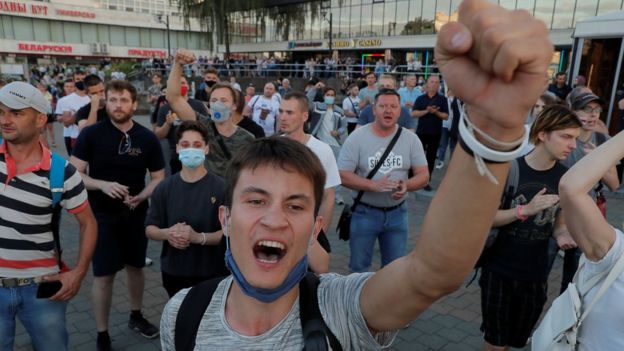
REUTERS
Protests erupted hours after Alexander Lukashenko was awarded victory in Sunday's presidential vote
"An internet shutdown is a huge mistake by the authorities," Nexta editor-in-chief Roman Protasevich told BBC Russian. "Telegram has picked up almost all Belarusians who are flooding the streets in an effort to bring about changes in the country."
With most of the opposition leadership out of the country, the channel has played a key role in co-ordinating the protests. But more established opposition media are wary of such an activist source of information whose messages are hard to verify.
Nexta has published calls for help, maps showing where police are located as well as addresses for protesters to hide in, and contacts for lawyers and human rights activists.
It has also advised subscribers how to bypass internet blocking by using proxies and other means.
Ahead of the third night of protests, it put out detailed instructions to protesters on how to act on the streets.
"An internet shutdown is a huge mistake by the authorities," Nexta editor-in-chief Roman Protasevich told BBC Russian. "Telegram has picked up almost all Belarusians who are flooding the streets in an effort to bring about changes in the country."
With most of the opposition leadership out of the country, the channel has played a key role in co-ordinating the protests. But more established opposition media are wary of such an activist source of information whose messages are hard to verify.
Nexta has published calls for help, maps showing where police are located as well as addresses for protesters to hide in, and contacts for lawyers and human rights activists.
It has also advised subscribers how to bypass internet blocking by using proxies and other means.
Ahead of the third night of protests, it put out detailed instructions to protesters on how to act on the streets.
What is Nexta?
It has no website, and only a small editorial team of four in Warsaw, but it does have a YouTube and a Telegram channel, and an audience hungry for information.
Its chief editor says they are "pioneers of cyber journalism", where video and photo content is "as brief, informative and illustrative as possible".
Founded five years ago as a YouTube music by teenager Stepan Putilo, also known as Stepan Svetlov, it translates from Belarusian as "someone".
The first video was a sarcastic cover version of a song, mocking the 2015 campaign ahead of the re-election of President Alexander Lukashenko. "For all of 20 years there's been no choice, only a worn-out tyre".
Five things you might not know about Belarus
How protests shook up the election
Europe's longest serving ruler facing unfamiliar pressure
Then it turned to corruption, theft and officials drunk driving, promising "honest information about the reality in Belarus".
"It was my hobby. I made funny videos for my relatives' birthdays. Then I decided to accumulate all the trash of Lukashenko's Belarus," Mr Putilo told human rights website Charter 97.
Telegram channel Nexta Live surfaced in 2018 and the following year a documentary about Belarus's autocratic leader attracted almost three million views on YouTube.
"The film tells in detail about how Lukashenko stole our country, dreams, freedom, future and 25 years of life," Stepan Putilo said.
A court in Belarus declared the film was "extremist".
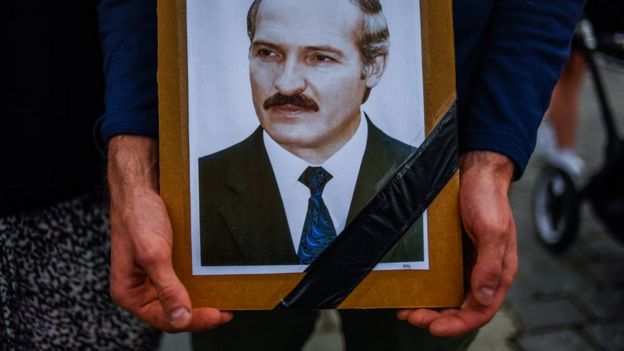
GETTY IMAGES
Alexander Lukashenko has ruled the former Soviet country since 1994
But Nexta's Telegram channel got noticed and the 2020 election took it to a new and bigger audience.
"Who in 2020 needs a site that any official from the ministry of information can block with one click?" its founders ask. Its Telegram posts have been attracting hundreds of thousands of views, more than websites such as Tut.by, hit by censorship.
What does it post?
Taking mainly user-generated content, Nexta uses anonymous material from across Belarus
.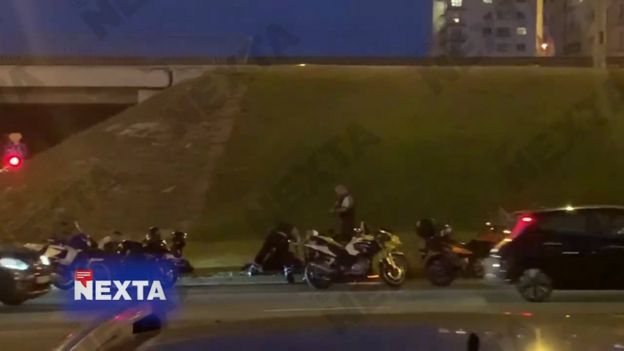

NEXTA LIVE
Scenes from three nights of protests and police responses were posted on the Nexta Live channel from across Belarus
The platform is secure, too, says Mr Protasevich, who argues that the stories they post would never get broadcast on state-run TV.
Like Stepan Putilo, he lives in Poland, where he applied for political asylum. Despite running the channel from outside Belarus he insists posts are checked for factual accuracy and he sees no issue about backing the protests from Warsaw.
Within hours, its audience grew on election night by 100,000 and then after two nights of protests it had amassed more than a million.
He says that although the channel mainly uses the information sent by users, he rejects criticism from such journalists inside Belarus. They say mistakes have been made, and they point to its apparent ability to co-ordinate protests.
Hours after Nexta reported that protester Yevgeny Zaichkin had died in the early hours of Monday, he told Reuters news agency he had survived a brutal beating from police.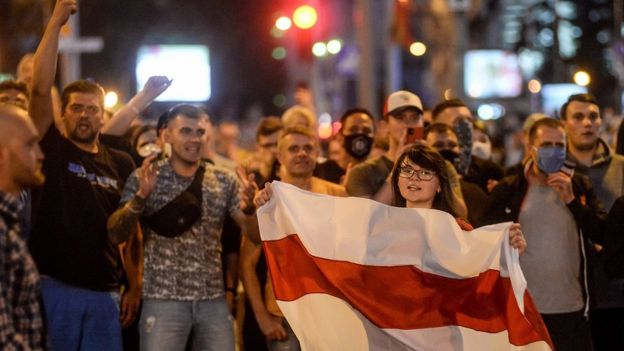
The platform is secure, too, says Mr Protasevich, who argues that the stories they post would never get broadcast on state-run TV.
Like Stepan Putilo, he lives in Poland, where he applied for political asylum. Despite running the channel from outside Belarus he insists posts are checked for factual accuracy and he sees no issue about backing the protests from Warsaw.
Within hours, its audience grew on election night by 100,000 and then after two nights of protests it had amassed more than a million.
He says that although the channel mainly uses the information sent by users, he rejects criticism from such journalists inside Belarus. They say mistakes have been made, and they point to its apparent ability to co-ordinate protests.
Hours after Nexta reported that protester Yevgeny Zaichkin had died in the early hours of Monday, he told Reuters news agency he had survived a brutal beating from police.

EPA
Protesters have accused riot police of brutality
Anna Kaltygina, from opposition website Tut.by, believes Nexta devalues media work by publishing unverified information and stirring revolution on the Telegram channel. "When working in Poland, it is difficult to fact-check messages that come from Belarus," she told Echo Moscow website.
Nexta's chief editor says what matters to him is the bloodshed on the streets. "Do I feel responsible for what we publish? Only in terms of whether it will bring people closer to victory and the end of the dictatorship."
Who finances it?
There is some confusion here. The channel has no ads and only the names of Stepan Putilo and Roman Protasevich are known.
Mr Putilo has said in the past that money has come from supporters as well as an earlier university scholarship.
However, his colleague told the BBC that they just had advertising and no donations.
A Belarusian petitions website recently called for state funding for Nexta, arguing it was far more useful than state TV.
No comments:
Post a Comment